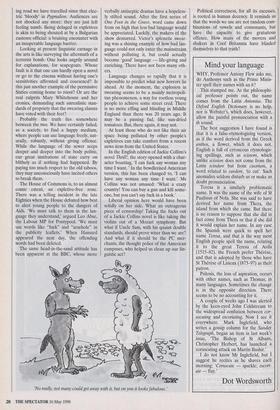Mind your language
WHY, Professor Antony Flew asks me, do Anthonys such as the Prime Minis- ter spell their names with an h?
This stumped me. As the philosophi- cal professor points out, the name comes from the Latin Antonius. The Oxford English Dictionary is no help, nor is Webster's, which does, however, allow the painful pronunciation with a th sound.
The best suggestion I have found is that it is a false-etymologising version, as if the word derived from the Greek anthos, a flower, which it does not. English is full of erroneous etymologis- ing spellings, such as scissors, which unlike scission does not come from the Latin scindere but from cisorium, a word related to caedere, 'to cut'. Such anomalies seldom disturb us or make us doubt pronunciation.
Teresa is a similarly problematic name. It was the name of the wife of St Paulinus of Nola. She was said to have derived her name from Thera, the island from which she came. But there is no reason to suppose that she did in fact come from Thera or that if she did it would explain her name. In any case the Spanish were quick to spell her name Teresa, and that is the way most English people spell the name, relating it to the great Teresa of Avila (1515-82). the French prefer Therese, and that is adopted by those who have St Therese of Lisieux (1873-97) as their patron.
Psilosis, the loss of aspiration, occurs with other names, such as Thomas, in many languages. Sometimes the change is in the opposite direction. There seems to be no accounting for it.
A couple of weeks ago I was alerted by the keen-eyed John Coldstream to the widespread confusion between cor- uscating and excoriating. Now I see it everywhere. Mark Inglefield, who writes a gossip column for the Sunday Telegraph, began an item in last week's issue, 'The Bishop of St Albans, Christopher Herbert, has launched a coruscating attack on Martin Bashir.'
I do not know Mr Inglefield, but I suggest he recites as he shaves each morning: 'Coruscate — sparkle; excori- ate — flay.'
Dot Wordsworth


























































 Previous page
Previous page